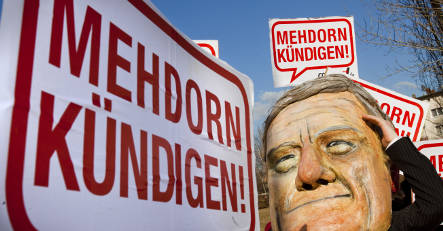Once upon a time there was a girl who could only convince the world that she was a princess after she lay for a night on 20 mattresses and could not get a wink of sleep. The reason: a pea at the bottom of the pile that had somehow dug into her skin. She was hyper-sensitive and therefore noble.
I was reminded of Andersen’s fairytale when I read recently that Hartmut Mehdorn, the thin-skinned prince of Germany’s railway operator Deutsche Bahn, has problems sleeping. According to Stern magazine, when it gets late on the 25th floor of Bahn headquarters in Berlin and the sensitive monarch is too wired to sleep, he summons the notorious “Red Wine Council.”
“Come on over,” Mehdorn reportedly orders on the phone. The courtiers then leave their nearby apartments around Potsdamer Platz, abandoning their beds, and return to the office to hear the late-night thoughts of Chairman Hartmut.
Now let me hasten to say – before my editor gets another angry letter from the shiny Bahn Tower – I am not criticising or even judging this practice. Great leaders often function best at night, undisturbed by telephones. They have their best ideas after midnight. Fidel Castro was like that. Josef Stalin too. Insomnia is a professional hazard.
It is, of course, a tense time at the Tower. Because of a scandal involving Deutsche Bahn spying on its own subjects – er, employees. Stern says there is a “Regime of Fear” in the headquarters which, according to my source – please don’t fire her! – is an absurd exaggeration. You just think twice about using your email or telephone.
My friend has closed her internet banking account but, she says, she would probably have done that anyway. Oh, and when we meet nowadays, we don’t go to any bar around Potsdamer Platz. But that’s okay. Normal. You have to understand, Prince Hartmut is under big pressure. Will he be sacked after the election this September? If so, he has to put his plans to privatise Deutsche Bahn into place in the next six months. Everything else is a distraction.
The fact is, I sympathise with the Prince of the Rails. I am one of the few people in Germany who feels Mehdorn’s pain. For the past few months, as part of the research for a book, I have been comparing the privatisation process in Britain, Iceland and Russia. It does not matter how mature the democracy is, corruption always creeps in – and usually in the 18 months before the company is floated on the stock market.
So Mehdorn’s suspicions his subjects are on the take are probably not unreasonable. Just as supermarkets have to ensure that employees don’t slip whisky, glazed ham, or razors in their handbags before leaving the shop, so too does Deutsche Bahn have to keep an eye out for corruption. Nobody wants privatisation to be poisoned at source. In fact, nobody wants privatisation at all. Naturally, the Bahn detectives also have to obey the law of the land. But if they don’t that is not necessarily a reason to sack Mehdorn unless it can be shown that he ordered illegal actions. So far I can see no evidence of this.
No, the real reason to sack Hartmut Mehdorn is safety. It is months since ICE 518 came off the tracks outside Cologne station. The cause was a break in a drive shaft and not surprisingly it made everyone in the railway universe a little nervous. Just minutes before the high-speed train had been travelling at 300 kph between Frankfurt and Cologne. It could have been another disaster like Eschede.
Deutsche Bahn approached the crisis with what appeared to be its usual Alice-in-Wonderland upside-down logic. Trains were withdrawn from service so that they could be tested. This led to delays. Friendly staff gave out bottles of free mineral water to frustrated passengers. Who found, when a train eventually arrived, that the toilets had been locked since they were positioned, with all their heavy water tanks, over the possibly fatal wheel assemblies. So we crossed our legs tightly, and our fingers too, and cursed the Bahn.
But the railway behaved absolutely correctly: safety trumps comfort. The difficulty came a little later, last autumn, after the government insisted that inspections of trains should be carried out every 30,000 kilometres instead of every 300,000 kilometres. Mehdorn protested in a furious letter to the Transport Ministry, which was the moment, I believe, when Prince Hartmut should have been asked to abdicate his throne.
Yes, there would have been more irritating delays and a loss of revenue. But a good Price of Rails would have gone on the offensive, used all of his persuasive skills to convince Germans that he wanted to reduce the risks of train travel.
It would have required strong leadership, an open, humble, apologetic manner. To be head of Deutsche Bahn nowadays one has to be a politician capable of entering a dialogue with citizens. Mehdorn has none of these qualities.
Sometimes I think that Prince Hartmut has become King Lear. And every time an ICE train makes an unusual noise, I will exchange anxious glances with my fellow passengers. That, and not his wannabe Stasi spy regime is why Mehdorn has to go.



 Please whitelist us to continue reading.
Please whitelist us to continue reading.